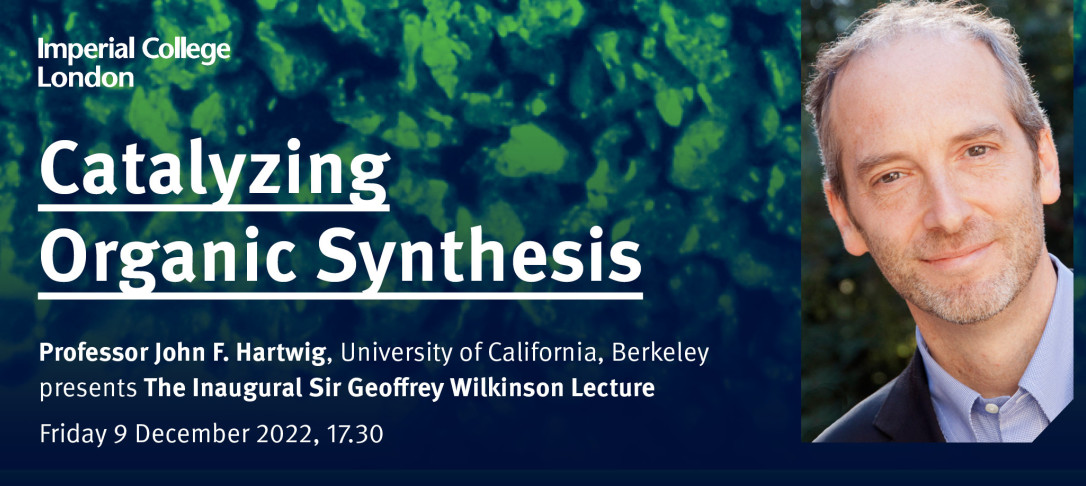
Join Professor John Hartwig, Henry Rapoport Chair in Organic Chemistry, University of California Berkeley as he delivers The Inaugural Sir Geoffrey Wilkinson Annual Lecture.
Please ensure you register in advance to receive the link.
Abstract:
From Prozac to perfume, sustainable plastics to solar energy, catalysis enables our current standard of living and controls our potential to progress sustainably. The reduced emissions of modern cars, the abundance of fresh food at our stores, the beginnings of green energy, and the new pharmaceuticals we use to treat disease are made possible by chemical reactions controlled by catalysts.
Research in my group has sought to design catalysts that can introduce and manipulate functional groups in both small and large organic molecules. These reactions encompass novel coupling processes to facilitate the synthesis of medicinally important molecules, reactions that enable the introduction of fluorine and new fluoroalkyl substituents, and reactions that enable the introduction of functional groups into positions of molecules inaccessible by classical organic reactions.
This lecture will introduce the importance of catalysis overall, some major challenges in the field, and ways that our group is seeking to address these challenges. Examples of important catalysts used today, and examples of strategies to discover and develop new classes of catalysts for future applications will be presented.
Biography:
Professor Hartwig was born in Elmhurst, IL, spent his childhood in upstate New York and received his A.B. from Princeton University. He received his Ph.D. from U.C. Berkeley with Robert Bergman and Richard Andersen and conducted a postdoctoral fellowship at MIT with Stephen Lippard. In 1992 he began his independent career at Yale University and became the Irenée P. DuPont Professor in 2004. In 2006, he moved to the University of Illinois, where he was the Kenneth L. Rinehart Jr. Professor of Chemistry, and in 2011, he returned to U.C. Berkley as the Henry Rapoport Professor.
Professor Hartwig’s research focuses on the discovery and understanding of new reactions for organic synthesis catalyzed by transition metal complexes. He is well known for contributions to widely practiced cross-coupling chemistry that form arylamines, aryl ethers, aryl sulfides, and α-aryl carbonyl compounds and for the discovery of practical C-H bond functionalization reactions. He has focused on the mechanism and fundamental organometallic chemistry that underpins them, including studies on reductive eliminations to form carbon-heteroatom bonds, oxidative addition of N-H bonds, and olefin insertions into amides and alkoxides. He is the author of the textbook “Organotransition Metal Chemistry: From Bonding to Catalysis.” He has received numerous awards, including the ACS award in Organometallic Chemistry, the H.C. Brown Award for Synthetic Methods, the Janssen Pharmaceutica Prize and the Tetrahedron Prize for Creativity in Organic Synthesis, the Willard Gibbs Medal, the 2019 Wolf Prize in Chemistry, and the 2021 Cope Award. He was elected to the National Academy of Sciences in 2012 and the American Academy of Arts and Sciences in 2015.
